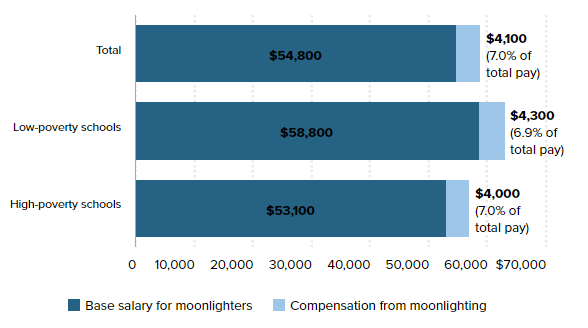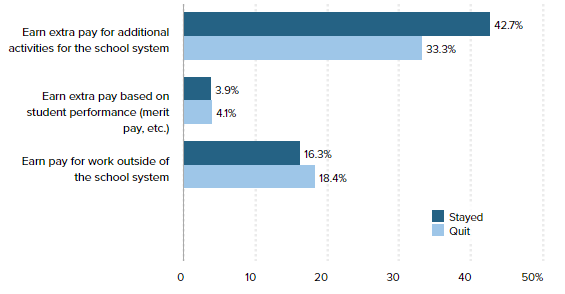Economy
Growing Number of Teachers Take on a Second Job to Make Ends Meet

Published:
Last Updated:

America’s public schools struggle with a variety of issues, ranging from student safety to whether they will be able to support a school drama club. While these issues are not all equally important, the reality is that parents and members of a school’s community look to school administrators and teachers to solve them all.
Teachers, however, are in short supply and even that supply is dwindling, according to a series of reports from the Economic Policy Institute (EPI). The shortage is influenced by low pay, a drop in prestige for public education as a profession and rising rates of teacher attrition. EPI’s latest report on teaching, released Thursday, notes that teacher pay has reached a record 21.4% less than pay in comparable jobs. In 1996, teacher pay was just 6.3% less than comparable worker pay.
One outcome of the pay disparity is that a growing number of teachers are taking on second jobs, and not just to supplement their teaching income. EPI researchers speculate that many teachers moonlight in order to make ends meet. The most common type (44% of teachers) of moonlighting is taking on a student extracurricular activity for which they are paid. Nearly a fifth (18%) have a second job outside the school system, while about 14% receive supplementary pay from the school system, including merit payments (almost 6%) based on student performance (presumably on standardized tests). In all, 59% of teachers have at least one source of additional income.
Last year, the nation’s 993,900 teachers represented the third-lowest paying occupation in the country despite being the largest. Teachers at schools in areas of high poverty earn even less — $5,600 less, or $53,300, compared to teachers in low-poverty areas, who earned an average of $58,900. Financial standing is just factor in identifying the states with the worst (and best) schools.
Moonlighting activities added an average of $4,100 to a teacher’s base pay, a 7% boost. The average base pay and average moonlighting pay were lower for teachers in high-poverty areas.

Among moonlighting teachers, those who quit their teaching jobs were paid $2,500 less, according to EPI’s report. Teachers who had second jobs outside the school system were more likely to quit than teachers who were paid by the system.

The EPI researchers conclude that the “relationship between teacher pay and the teacher shortage suggests that policy interventions and institutional decisions to invest more in teacher pay and to widen teachers’ access to paid profession-building activities such as coaching and mentoring could help address the teacher shortage.” The need is even more acute in high-poverty areas that require more support and funding for their teachers, “not only to support students directly, but also to reduce teacher shortages.”
The U.S. cities where teachers are the most underpaid, however, do not appear to include a lot of high-poverty areas. Although, most are located in conservative states, where government spending tends to be restrained.
Because most education funding is a state and local government function, there is wide variation among the best and worst states for teachers.
If you’re one of the over 4 Million Americans set to retire this year, you may want to pay attention.
Finding a financial advisor who puts your interest first can be the difference between a rich retirement and barely getting by, and today it’s easier than ever. SmartAsset’s free tool matches you with up to three fiduciary financial advisors that serve your area in minutes. Each advisor has been carefully vetted, and must act in your best interests. Start your search now.
Don’t waste another minute; get started right here and help your retirement dreams become a retirement reality.
Thank you for reading! Have some feedback for us?
Contact the 24/7 Wall St. editorial team.